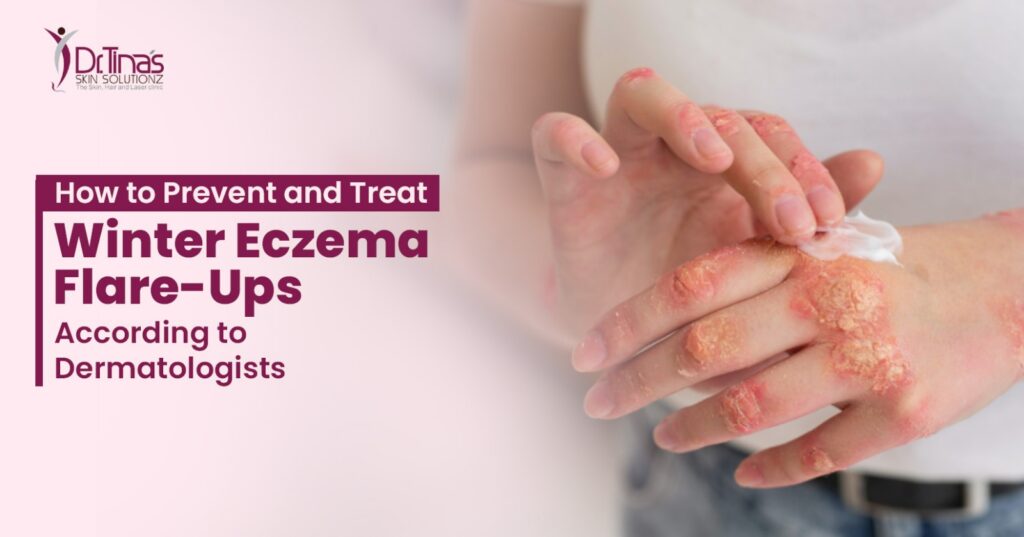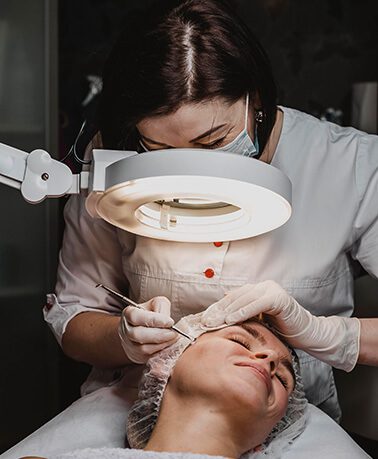How to Prevent and Treat Winter Eczema Flare-Ups According to Dermatologists

Brrrr it’s cold in Bangalore ! it’s the season for dry patches, itching, and irritation.
One of the most common skin conditions exacerbated by the winter season is eczema, also known as atopic dermatitis.
Winter eczema flare-ups can be particularly challenging due to the combination of cold air, low humidity, and indoor heating, all of which strip the skin of moisture and trigger irritation.
According to dermatologists, preventing and treating winter eczema flare-ups requires a combination of effective skincare practices and medical treatment. In this blog, we will discuss how to control eczema in winter, the best ways to prevent flare-ups and provide expert advice from a skin dermatologist in Bangalore.
Understanding Winter Eczema
Eczema is a chronic skin condition that causes inflammation, dryness, and itchiness. It can be triggered by environmental factors such as changes in weather, allergens, stress, and harsh skincare products. During the winter months, eczema flare-ups become more common as cold air and heating systems contribute to the skin losing moisture.
The skin’s natural barrier weakens, leading to increased dryness and irritation, which can trigger an eczema flare-up.
What Causes Winter Eczema Flare-Ups?
Winter is a challenging season for those who suffer from eczema, a chronic skin condition that causes inflammation, dryness, and intense itching. While eczema can flare up at any time of the year, the colder months often trigger more frequent and severe episodes. This is due to a combination of environmental factors that dry out the skin, weaken its protective barrier, and make it more susceptible to irritation.
Understanding the causes of winter eczema flare-ups is essential for managing the condition and finding relief. In this section, we’ll explore the main factors that contribute to winter eczema flare-ups and how they affect the skin.
- Cold Weather: The colder temperatures and low humidity levels in winter cause the skin to lose moisture, leading to dryness and irritation, making eczema more prone to flare-ups.
- Indoor Heating: While it keeps us warm, indoor heating reduces moisture levels in the air, which can further dehydrate the skin and worsen eczema symptoms.
- Hot Showers: Though tempting during the cold months, long hot showers can strip the skin of its natural oils, leading to dryness and making eczema worse.
- Tight or woollen Clothing: Winter clothing, especially woolen fabrics, can irritate the skin, triggering flare-ups in people with eczema.
How to Control Eczema in Winter
Managing winter eczema involves both preventive measures and treatments to relieve flare-ups. Here are some dermatologist-approved tips on how to prevent and treat eczema in the colder months:
1. Moisturize Frequently
The key to controlling winter eczema is keeping the skin well-moisturized. Dermatologists recommend applying a thick, emollient-rich moisturizer immediately after showering to lock in moisture.
Hygroscopic products , which retains and locks moisturization . Look for products that contain ingredients like ceramides, glycerin, or hyaluronic acid, which help repair and hydrate the skin barrier. It’s also essential to moisturize throughout the day, especially if your skin feels tight or dry.
2. Avoid Hot Showers and Baths
Hot water can strip the skin of its natural oils, worsening eczema. Instead, opt for lukewarm water and keep showers or baths short—about 5 to 10 minutes. After bathing, gently pat your skin dry with a towel and apply moisturizer immediately to prevent further moisture loss.
3. Use Gentle, Fragrance-Free Products
Avoid using harsh soaps, perfumes, or skincare products with artificial fragrances. These can irritate the skin and exacerbate eczema symptoms. Dermatologists recommend using mild, fragrance-free cleansers and skincare products designed specifically for sensitive skin.
4. Wear Soft, Breathable Fabrics
Wool, while cozy, can be an irritant to sensitive skin. Opt for clothing made of soft, breathable fabrics like cotton, which are less likely to trigger eczema flare-ups. If you do wear wool, make sure it’s layered over a soft cotton base to protect your skin.
5. Maintain a Humid Environment
Since winter air is often dry, using a humidifier in your home can help add moisture to the air, preventing your skin from becoming too dry. Place the humidifier in your bedroom while you sleep to maintain optimal moisture levels.
6. Limit Stress
Stress is a known trigger for eczema flare-ups. While it’s not always possible to avoid stress, practicing relaxation techniques like meditation, yoga, or deep breathing can help reduce its impact on your skin.
7. Keep Your Skin Cool
Although it’s cold outside, overheating can still trigger eczema. Avoid bundling up too much in layers, and try to keep your skin cool by dressing in breathable fabrics. If you do get too warm, take off a layer of clothing to prevent sweating and irritation.
8. Eat More Hydrating Food Products
Colorful food produce like vegetables omega 3 Fatty acid containing food like fish flaxseeds walnuts . Consuming more water , inspite of weather being cold .
Winter Eczema Treatments Recommended by Dermatologists
While preventive measures are crucial, treating eczema flare-ups may require more intensive interventions.
Here are some dermatologist-recommended treatments for winter eczema:
1. Topical Steroid Creams
In cases of severe eczema flare-ups, a dermatologist may prescribe topical steroids to reduce inflammation and control itching. These should be used as directed and under the supervision of a skin dermatologist, as overuse can lead to skin thinning.
2. Topical Calcineurin Inhibitors
For those who cannot tolerate steroid creams, non-steroidal options like topical calcineurin inhibitors (e.g., tacrolimus or pimecrolimus) may be recommended. These help reduce inflammation and are less likely to cause side effects.
3. Antihistamines
To help control itching, especially at night, your dermatologist may recommend antihistamines. These can provide relief and help you sleep better, as itching often worsens during the evening hours.
4. Wet Wrap Therapy
For severe eczema flare-ups, dermatologists may recommend wet wrap therapy. This involves applying a thick layer of moisturizer to the affected area, followed by a damp cloth or gauze, and then wrapping it with a dry cloth. This helps to hydrate the skin and reduce inflammation.
5. Phototherapy
In some cases, dermatologists may suggest phototherapy, a treatment that uses controlled ultraviolet (UV) light to reduce inflammation and improve the skin’s barrier function. This is typically used for more severe eczema that doesn’t respond to topical treatments.
When to Consult a Dermatologist
If your eczema flare-ups are frequent, severe, or not responding to over-the-counter treatments, it’s time to consult a dermatologist. A skin care dermatologist can help create a personalized treatment plan, recommend prescription-strength creams, and identify potential triggers that you may not be aware of.
Conclusion
Winter eczema flare-ups are a common concern, but with the right preventive measures and treatments, it’s possible to control and manage the condition during the colder months. Moisturizing regularly, avoiding hot showers, and using gentle products are essential for winter eczema care. If flare-ups become severe, seeking the advice of a dermatologist in Bangalore or your area is crucial for effective treatment. Taking care of your skin in winter ensures that your eczema doesn’t interfere with your comfort and confidence.
For personalized advice on managing eczema or any other skin concerns, consider consulting our trusted dermatologist from Dr. Tina’s Skin Solutionz. By following these expert tips, you can enjoy the winter season without the discomfort of eczema flare-ups.

Dr.Tina Ramachander is one of the best dermatologist in Bangalore and Medical Director at Dr.Tina’s Skin Solutionz, a skin care clinic in Bangalore. She completed her master’s in dermatology from the well acclaimed JJM Medical college in Karnataka and is now a practicising dermatosurgeon and Medical Cosmetologist in Bangalore.

